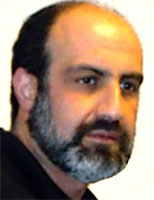| |
We humans are naturally gullible — disbelieving requires an extraordinary expenditure of energy. It is a limited resource. I suggest ranking the skepticism by its consequences on our lives. True, the dangers of organized religion used to be there — but they have been gradually replaced with considerably ruthless and unintrospective social-science ideology. THE
OPIATES OF THE MIDDLE CLASSES [9.26.05]
NASSIM NICHOLAS TALEB, an essayist and mathematical trader, is the author of Fooled By Randomness. |
|
THE OPIATES OF THE MIDDLE CLASSES [NASSIM TALEB:] As a practitioner of science, I am opposed to teaching religious ideas in schools. But, it seems to me somewhat misplaced energy — more of a fight for principles than for any bottom line. As an empirical skeptic, I would like to introduce a dimension to the debates: relevance, consequence, and our ability to correct a situation — in other words the impact on our daily lives. My portrait of the perfect fool of randomness is as follows: he does not believe in religion, providing entirely rational reasons for such disbelief. He opposes scientific method to superstition and blind faith. But alas, human skepticism appears to be quite domain-specific and relegated to the classroom. Somehow the skepticism of my fool undergoes a severe atrophy outside of these intellectual debates:
Now I am not arguing that one should ignore the side effects of religion — given the accounts of past intolerance. But it was in these columns that Richard Dawkins, echoing the great Peter Medawar, recommended bright students to find something worthwhile "to be smart about". Likewise, I suggest exerting our skepticism "where it matters". Why? Because, alas, cognitively, our resource to doubt is rather limited. We humans are naturally gullible — disbelieving requires an extraordinary expenditure of energy. It is a limited resource. I suggest ranking the skepticism by its consequences on our lives. True, the dangers of organized religion used to be there — but they have been gradually replaced with considerably ruthless and unintrospective social-science ideology. Religion gives many people solace. On a personal note I have to admit that I feel more elevated in cathedrals than in stock markets — be it only on aesthetic grounds. If I were going to be gullible about a subject, I would rather pick one that is the least harmful to my future — and one that is rewarding to my thirst for aesthetics. It is high time to worry about the opiates of the middle class. |
| SUMMER BOOKS |
| John Brockman, Editor and Publisher |
| |Top| |

